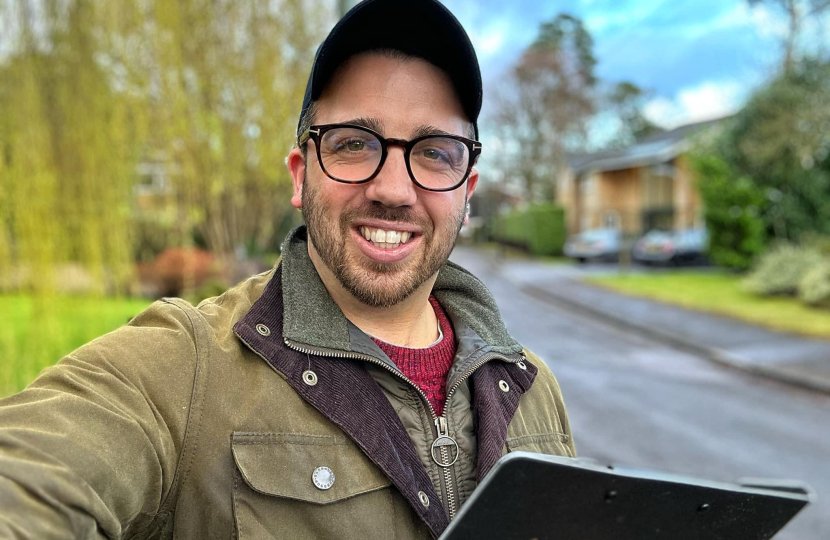
I’ve been a Conservative Party member since I was 15, and like so many of you I’ve seen my fair share of highs and lows for our Party. The result on the 4th July sits at the top of those lows, despite strong local campaigns and an incredible effort by so many across our Party, I witnessed good friends - and great MPs - lose their seats.
However, if I know anything about our Conservative family it’s that we respect democracy and look ahead to how we can once again win back the trust and support of voters.
It’s quite the contrast really. Already, just weeks in to power Labour are showing us - and more importantly the country - what they’re really about. Pushing the elderly into poverty, axing infrastructure projects, casting doubt over new hospital builds, risking economic recovery with inflation-busting public sector pay rises, centralising planning decisions and shelving £1.3bn tech and AI plans. The case is often made for getting unpopular decisions out the door early, with us voters forgetting all about it come the next election. I don’t agree - voters have long memories; if we do our job as the official opposition, hold this new Labour Government to account and communicate our message well, then come the next election voters will be in no doubt as to the value of their vote.
Now for a few thoughts on our rebuild.
2024 non-voters
The number of votes for the Conservative Party dropped by 7 million votes in 2024. Overall, the number of votes cast in 2024 dropped by 4 million compared to 2019 - from the conversations I had on the doorstep, we can assume that a fair number of these voters were disenchanted Conservatives.
A priority for us needs to be giving these voters who this time stayed at home a reason to vote. I’m sure many of those voters will be watching with horror as Labour sets out its priorities for Government - so different from what they promised on the campaign trail. If we get our house back into order and work to regain their trust, then I believe these voters could once again put their cross in the Conservative box.
Reform voters
Reform candidates attracted over 4 million votes. Some of these would've been 2019 Brexit Party supporters, some previously Labour voters, but again we can be pretty sure that a large number would have been former Conservative voters.
Of the Reform voters I spoke to, Immigration was definitely a concern for them, and there's no getting away from our inability to deal with this issue despite separating ourselves from the EU. However, over and above any policy the response most common on the doorstep was that for the natural party of Government, we'd lost our way and therefore the right to govern.
Interestingly and contrary to the belief of some, electing Labour by voting Reform didn’t concern them. They thought we’d had our chance and it was time for a change. Of course in 2010, 2015, 2017 and 2019, we warned people that a vote for UKIP, Brexit Party or Reform was a vote for a Labour Government - thankfully that didn't happen. However, in 2024 that's exactly what happened. I’d hesitate a guess that if an election were to be held tomorrow, a fair proportion of 2024 Reform supporters would vote differently now that Reform = Labour has become reality. We should nevertheless heed their words - it wasn't all about immigration, but about integrity, too.
Political Math
As it turned out, by-elections painted a picture for what was to come at this year's General Election - Labour's vote barely increasing from their record defeat in 2019, but the Conservative share of the vote falling in hundreds of seats. In effect, hundreds of Labour MPs have voter apathy and Reform to thank for their position on the Green Benches. The good news is that if we can win back the two voter groups above and focus on winning back Labour seats with a majority of 5,000 or less - which I think is achievable - then we could find ourselves sitting on 250 seats. Higher if we can re-gain the Crawley’s, Bournemouth’s and Preston’s of the world!
That would nevertheless likely still leave us with some way to go if we are to reach 326 and secure a majority in the House of Commons.
This is the crunch moment; do we focus solely on regaining Reform and 2024 non-voters, look at a 10 year long distance strategy, build the foundations in 2028/9 and then on to Government in the early 2030s? I expect some believe this to be the realistic position.
OR do we aim higher, enter a sprint and do all we can to return to Government in 2028/29. Labour’s majority is built on sand, they were elected on less than 34% of the vote and their Prime Minister was struggling on popularity the day he walked into Number 10. But to achieve such a feat we’d need to be winning over Reform switchers, 2024 non-voters and another crucial set of the electorate.
Lib Dem voters
I’ve often found myself campaigning against the Lib Dem’s, first where I grew up on the Isle of Wight, and then the length and breadth of the country. I’ve beaten them at the ballot box myself and supported others to do the same in local and national elections. And I’ve again witnessed our good times - reducing the Lib Dem’s to just 8 seats in 2015 - and our not so good times - when the Lib Dem’s leapt up to some 72 seats this year.
It’s worth noting that of the 72 seats won on the 4th July - and taking by-election wins 2019-2024 out of the equation - 59 were Lib Dem gains from the Conservatives.
31 of those 59 seats have never not been Conservative before. When trying to reach that magic number of 326 to firm a majority, winning back those 31 seats will look ever more crucial.
Of course similar to the seats Labour gained, there are Reform voters and 2024 non-voters in Lib Dem facing seats too. But in contrast to the poor performance of Labour, voters actively decided to turn out and vote Lib Dem this time, seeing notable increases in their share of the vote of 16% in Wells and Mendip Hills, 17% in North Cornwall and 14% in Mid Sussex.
Less than a decade earlier, it would’ve been these same voters who sent Cameron back into number 10, having elected or re-elected their Conservative MP. In some cases these MPs were returned with significant majorities - Epsom and Ewell, Horsham, Harrogate & Knaresborough, North East Hampshire and Tunbridge Wells to name a few.
So what's the key to winning these voters back? Well without wishing to compliment the Lib Dem’s, you and I know well enough they are beyond difficult to get rid of - as a keen gardener, some kind of yellow Knotweed comes to mind! That said, many people vote Lib Dem because they can’t bring themselves to vote Labour. Selecting new candidates for seats early and creating our own 'local champions' who can outline that voting for your local Lib Dem MP - however fluffy they might be - will only extend the life of an unpopular Labour Government could help us. There are plenty of Lib Dem voters who align with modern-day conservative values and who want to see a reduction in immigration. Many live in more rural areas of the country and so care deeply about conserving the natural environment and the character of their rural communities. However, as for the other voter groups, key to us winning them back is proving that we are not only capable of governing with absolute integrity, but also deserving of that privilege.
So what's next?
As we head into the summer, our 6 leadership contenders - all brilliant in their own right - begin to make their way around the country. Each will have their own pitch to us as members, and I'm hoping that part of that will be how they intend to ensure our Party appeals to each of the voter groups I've mentioned above.
I believe that with the right coalition of voters, we can win back Labour and Lib Dem seats taken from us this year - together with a Green or two! - paving our way back to Government at the next election.
Indeed given the sorry state of the new Labour Government, I’d argue it’s in the interests of our communities and our country that we do so as soon as possible.

